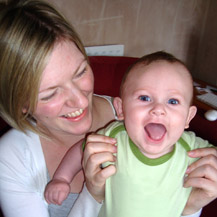It’s a girl! Life of a royal baby
The new royal baby has been born into a position of great privilege and good fortune. She will be admired and fêted wherever she goes. But there is a catch. The princess is also the spare, the next in line who, barring accidents, will never inherit the throne. And that means that her life, however blessed, will be far more complicated than that of her elder brother, Prince George.
The new baby is part of the royal family’s insurance policy. To be sure, she will be an integral and much-loved part of a family tied by the same bonds that unite any other family, and in that sense an equal in her parents’ eyes to any of her siblings. But in another sense she cannot be equal; one child is born to rule, the others are born to trail in his wake.
One does not have to look far to see how the position of being the royal spare has both benefits and drawbacks. Prince Harry has always played a different role in life, and come across as a very different character, when compared with Prince William. Harry is reckless, passionate, impetuous, a young man who has not always considered the implications of his actions until it is too late. William, in contrast, is cautious, measured, thoughtful, to the extent that he can sometimes spend an age considering an issue before he makes up his mind on a course of action.
There is no doubt Harry would not have been able to serve on the frontline in Afghanistan if he had been second in line to the throne.
“There is no set role for the spare — that is what makes it so very difficult,” said Penny Junor, who has written biographies of William and Harry. “You may be needed, because the spares have been needed going back through history, not least with George VI.
“Historically, people who have been the spare have run into difficulty with it, such as Princess Margaret. Andrew has found it difficult. They start off with a psychological disadvantage… Diana always referred to Harry as the spare. It is not great for the person’s self-confidence.”
As a boy, Junor said, Harry was shy and retiring, while William was more outgoing; then they reversed their roles, and Harry became the risk-taker. “He can afford to take the risks. But it is impossible to know how he would have been if he had been the heir and William the spare. But I think that Harry grew up feeling not very confident.”
The two princes are not the first royal siblings to discover the gulf that lies between the heir and the spare. For the Queen and Princess Margaret, however, not all the differences in their starkly contrasting characters can be attributed to the fact that Princess Elizabeth would become Queen; it was not until the abdication of her uncle, Edward VIII, when she was ten, that her destiny was sealed.
The two sisters were different from the start. As Sarah Bradford says in her biography of the Queen: “Margaret was an entirely opposite character to Elizabeth. She was extrovert, capricious, attention-seeking and naughty. One of her governesses said that she was the most difficult child she had ever had to teach.”
Elizabeth was always protective of her sister, and Margaret gave her total loyalty. “The relationship established in the nursery was to continue into their adult lives, with Elizabeth as the responsible elder sister and Margaret as the naughty girl always getting into scrapes,” wrote Bradford.
Those scrapes could be a serious business, from the marriage that never was to Group Captain Peter Townsend, to her tempestuous marriage, and later divorce, from Lord Snowdon.
The new princess can, at least, be thankful that she lives in more enlightened times. While the Townsend affair undoubtedly blighted Margaret’s life, perhaps greater damage was done by the emptiness of her life. She was intellectually starved; with only a few official engagements to trouble her, she had nothing to do but play. By the next generation, the spares — and this time there were three — knew they had their work cut out.
Prince Andrew opted for the Royal Navy and flying helicopters, before retiring and working hard to justify his existence as a trade ambassador. Given the controversy that has dogged his name, his efforts have had mixed results. Prince Edward tried the Royal Marines, failed, then theatre and TV production — more failure — before opting for the life of a little-noticed member of the royal family, carrying out his engagements without fuss.
The Princess Royal has made a better fist of things than either of them. Even more of a spare than they were — she was destined under the now-outdated rules always to be last in the line of succession after her brothers and their children — she has been an Olympic horsewoman, a president of Save the Children and was for years the hardest-working member of the family. She is also the least grand of her siblings, eschewing royal titles for her children, who have led as normal a life as is possible for grandchildren of the Queen.
For the moment, the big decisions about what sort of life the latest addition to the royal family will lead are out of her hands. What we have seen so far, and will doubtless continue to see, is the continuing evolution in the way members of the royal family choose to bring up their children.
Just three generations ago, when Elizabeth and Margaret were girls, it was considered perfectly normal for royal children to be educated at home, fairytale princesses hidden in a fairytale tower. In contrast, the Duke and Duchess of Cambridge — two people who are only too conscious of the importance of a happy and secure family life — are determined to bring up their children in as close an approximation to normality as possible.
That means the bare minimum of staff. When Prince George was born, his parents were so set on doing everything themselves that they did without paid help, relying instead on Carole Middleton; mother and baby spent the first few weeks of George’s life in Bucklebury.
There is no need for that now; they have got Anmer Hall. Their ten-bedroom home on the Sandringham estate in Norfolk is secluded and safe. In those hectic first days, George’s nanny, Maria Borrallo, will be on hand to help, as will Kate’s mother. By all accounts Carole has made herself almost indispensable there, from sourcing wallpaper for the new baby’s nursery to making William cheese on toast to eat in front of Downton Abbey.
William will be there, too, on paternity leave. There won’t, however, be a maternity nurse, just as there wasn’t for George. William and Kate will want their family to grow up with as much privacy as possible. Then there are the imponderables. What sort of person will the princess grow up to be? What sort of a relationship will she have with George? With her parents? But it is not until later, when she is old enough to make her own decisions, that she will have the answer to the really interesting question: just what does the modern royal — the modern spare — do with her life?
Junor said: “It is vital for anybody who is going to spend a life in the royal family doing royal duties to achieve their own personal goals before they launch themselves into cutting ribbons and shaking hands full time. That was absolutely the making of both William and Harry.
“Being a royal can give members of the family a very empty feeling. They are hugely famous, everybody curtsies and bows before them, and yet what have they actually done, apart from being born to a particular family? There is a need to prove to themselves that they are just as good as other people.”
There is, however, no need to worry about that quite yet, Your (Very Young) Royal Highness. For the moment, everyone thinks you are absolutely great.


